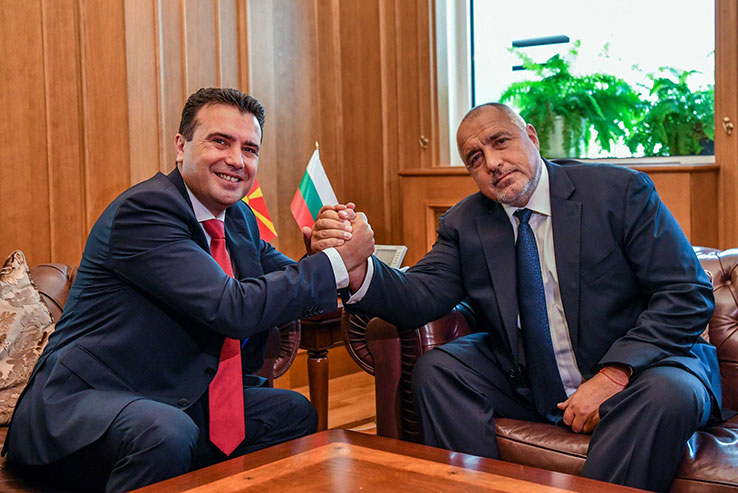The text is a response to the blog "On unifying around our common history - Tsar Samuil erga omnes (II)" by Naum Kajchev, published on May 21, 2021.
Ognen Vangelov and Ljupco Risteski
 We consider that the theses represented by Mr. N. Kajchev contribute precisely to the increase and strengthening of the conflict between the two peoples and states. The theses and the approach of Mr. N. Kajchev contribute to new difficult-to-bridge misunderstandings between future generations of Bulgarians and Macedonians.
We consider that the theses represented by Mr. N. Kajchev contribute precisely to the increase and strengthening of the conflict between the two peoples and states. The theses and the approach of Mr. N. Kajchev contribute to new difficult-to-bridge misunderstandings between future generations of Bulgarians and Macedonians.
Mr. Naum Kajchev is guiding the discussion back into a circle in regards to the interpretations of the medieval period, aiming to expose the substantive debate of Samuel's Empire to the media, and at the same time, by referencing Western studies, give the impression that both regional and world medieval history experts unanimously agree that medieval empires, (the First Bulgarian Empire, the Second Bulgarian Empire and Samuel’s Empire) are treated as Bulgarian in the sense of national (ethno-national) identity.
Interpretation of the studies, not indisputable facts
Concerning the interpretations of the character of the Bulgarian medieval states and the ethnic identity of their population, including the population in Macedonia, which was a part of them on several occasions, the members of the Bulgarian side of the Commission take the stand that "a process of permanent ethnic homogenization took place", while in the previous article Mr. N. Kajchev stated that the "medieval Bulgarian national identity" has consolidated. Let's be completely clear. This is an interpretation of the studies, not indisputable facts.
The problem with such an approach is that the "medieval Bulgarian nationality" is perceived as a logical and direct ancestor of the modern Bulgarian ethno-nation, which also includes the Macedonians. Mr. N. Kajchev says that he never claimed that it was a matter of "ten centuries of ethnic homogenization", but the very insistence on "permanent ethnic homogenization" of the consolidated Bulgarian national identity is a claim of ethno-national continuity of the population named as Bulgarians in that period and throughout the Middle Ages, until the middle of the 20th century, and Macedonians, it turns out, are merely a derivation (created in 1944) of that single common Bulgarian identity lasting until 1944.
In fact, the co-chair of the Commission from the Bulgarian side, Mr. Angel Dimitrov has stated precisely this to the media these days — that they can recognize a Macedonian people and language from 1944 onwards. This means that the entire cultural and historical heritage from the past on the territory of Macedonia is the heritage of the Bulgarian people from the ninth century up to 1944. This is exactly the thesis of "ten centuries of ethnic homogeneity" of the nationality of the territories of today's countries of Bulgaria and Macedonia (and beyond).
And that is why it is superfluous to talk about how those medieval empires are characterized in literature, because all those studies talk about the Byzantine period and the different empires in a medieval context, without dealing with the construction of myths about ethno-national historical heritages from that period to this day. Naming the empires Bulgarian is really of secondary and even tertiary importance. We, as members of the Commission, do not dispute at all the nomenclature of those empires in the various studies. Nor do we believe that this is an issue that we as a Commission should ascertain.
However, we cannot agree to associate that nomenclature with an ethno-national continuity of the Bulgarian people in Bulgaria, Macedonia and beyond, from the ninth century until today and especially not for that to be presented in Macedonian textbooks. We certainly recommend that it not be presented in Bulgarian textbooks either. Mr. N. Kajchev and other members from the Bulgarian side referrence quotes as evidence of the thesis they are constructing, with which we do not agree and will not be able to agree in the future. And this disagreement is not based on some sort of whim, but a principled position of the Macedonian part of the commission.
We reiterate that we do not see our mandate as a "Commission for Historical Truth" but as a Commission that should give recommendations to the governments of the two countries for joint remembrance of certain events and personalities, in order to improve neighbourly relations, not to confirm a common "Bulgarian" history. In the process of building mutual trust in the spirit of the Good-Neighbor Agreement between the two countries and the letter of European values, both sides should and must agree on the outcome. If that fails, this process shall lose its European values, and as several eminent European authorities in the field of the study of memory policies have already recommended, it would only mean replacing one collective way of memory with another, which will neither solve the problems within our societies nor beyond.
We can all witness that this process has not improved the relations between the two countries, on the contrary it has become a stumbling block, a mechanism for instrumentalizing and translating political views into an ultimatum from one neighbouring country against another, in a process in which that country seeks support for opening talks for full EU membership. And the improvement of history textbooks, in accordance with all the recommendations of international experts, as well as the positive European and world experience, should be done in a way that reduces the conflicts between the two societies over the interpretations of the past, and not replace the national i.e., nationalist discourses and at the same time replicate the national historical narrative of one modern European nation onto another modern nation. We consider that the theses represented by Mr. N. Kajchev contribute precisely to the increase and strengthening of the conflict between the two peoples and states. The theses and the approach of Mr. N. Kajchev contribute to new difficult-to-bridge misunderstandings between future generations of Bulgarians and Macedonians.
Here it is important to explain why we consider the thesis about the Bulgarian national identity that was consolidated from the 9th-11th century and is the basis of one of our common historical identities, which was forcibly divided in the middle of the 20th century due to a conspiracy, be it of the communists, the Comintern and Tito, be it of the Serbs, and the like - as utterly contestable, controversial and unsustainable.
Controversial claim of a “Consolidated Bulgarian national identity" in the 9th-11th century
In historical sociology, it is almost consensually accepted that nations are the product of social and political processes ongoing for the most part in the late 18th century, followed by those of the 19th and 20th centuries. Nation-building processes still exist today. Few historians and sociologists date the beginning of nations slightly earlier than that period (17th century), at least for some nations, but none speak of "consolidated medieval peoples" because it is nearly impossible to determine the ethnic and identity continuity of today's populations with the populations of the past. Here it is important to emphasize that when Mr. N. Kajchev speaks of a "consolidated national identity" he consciously or unconsciously uses concepts used to define nations. And even if there were some sort of "consolidated Bulgarian national identity" (which is extremely controversial in any case) in the 9th-11th century, what weight does that carry? It must mean something and have some context. Is that national identity a direct ancestor of today's Bulgarians (and Macedonians)? Given that the colleagues from the Bulgarian side claim that the Macedonian national identity did not exist before 1944, we should conclude that our peoples have a common origin, and that is the Bulgarian origin created in the 9th - 11th century.
 Source: mia.mk
Source: mia.mk
Such a claim cannot be supported linguistically or institutionally, nor according to any other ethnic markers can we talk about such national (i.e., ethno-national) continuities. The story becomes particularly complicated in the Slavic world, given the closeness of languages and cultures as well as dialectal continuums mostly coming from the areas populated by peoples who speak Slavic languages. This is not much diffeerent in the German and Romanian groups of peoples, of course with their respective specific contexts.
Rather, we are talking about radical discontinuities and changes, and not continuities, even in countries with a continuous medieval state and institutional tradition such as France (a great example of this is Eugen Weber's book Peasants into Frenchmen). Not to mention countries whose supposed medieval predecessors, which for the most part were in completely different territories from the present.
Modern states are precisely the tools for creating and consolidating ethno-national identities. This means that the idea of a nation's identity according to some characteristics that are defined as authentic and indigenous is largely the result of processes established by states, and not vice versa. Occasionally there are movements for national emancipation in response to the creation of certain states. Whatever the specific situation, it is quite clear that ethno-national identities are created precisely in the context of co-established ethno-national identities, often already established within certain state outlines, as models for new states and self-determination.
The world authorities who have studied and are studying the creation of nations, nationalisms as well as ethno-national identities through vast empirical and comparative research, convincingly show us that today's ethno-national identities are a construct of modern times. Of course, there are differences in the construction of national identities in different regions and contexts, due to different influences and factors. It is also understood that most national identities rely on some previous traditions (whether state, cultural, religious, oral traditions, etc.).
But all those constructs about the "origin story" of a nation take place within state contexts or in the context of aspirations for new states or aspirations for cultural and/or territorial autonomy. And the ideas of ethno-national continuity for thousands of years are exactly ideas created by the educational and cultural institutions of the new countries, not vice versa. Or these are ideas created against existing and dominant narratives. According to the domino-effect principle, when a state emanates certain values about what national and linguistic identity means, the states that are created after it (and sometimes in response to it) imitate such principles of setting their own national identities and language standards. And it is already quite well elaborated and known in historical sociology and politics science in general.
Nationalism is the inventor of nations
Ernest Gellner, already considered one of the nation's classic theorists, talks about pre-modern political entities (which he calls agrarian societies versus modern industrial ones) in his masterpiece Nations and Nationalism, saying that they were trans-ethnic and trans- political. Populations in such societies were largely tied to religion, church, or dynasty, not to the state and ubiquitous culture. Thus, the medieval kingdoms of this region (and not only here) were precisely such societies. One cannot even bring up medieval consolidated national identity, nor mention homogenization in such social settings.
If there is still any point in talking about cultural differentiation in the Middle Ages, it would primarily be set at the level of linguistic differentiation (Slavic versus Greek, Latin and Hebrew), rather than some ethnic Bulgarian versus Macedonian or Serbian or Croatian or Slovenian or Polish. or Slovakian, etc. Such ethnic categories developed much later than the 9th-11th century, and during the later centuries there were not always univocal and strongly established ethnic identifications or designations both in the Balkans and throughout Europe, until the creation of nation states. That is why Gellner says that nationalism is not the "awakening of nations and their self-consciousness" as is often believed, but that nationalism is the inventor of nations.
Benedict Anderson, who is also already considered a classic theorist of nations and nationalism, and at the same time a political scientist and historian, says in his work Imagined Communities that all communities that are larger than primordial villages where people had face-to-face contact (and sometimes even such villages) were imagined or constructed. He believes that one of the strongest factors in creating national consciousness is the development of capitalism and the printing press (he calls it print capitalism). In fact, he believes that the first national identities were not created on European soil but in the Creole communities in Latin American countries.
Scientists are still debating about the main factors that led to the development of nations and nationalisms as well as the exact period or the so-called "first nation", and there is no general consensus on that (there are dominant and non-dominant views), but there is an almost universal consensus in historical sociology that national consciousness and identities are constructs of modern times, and that pre-modern identities (from the Middle Ages and prior to those, from ancient times ) are based on completely different societal relations that are difficult to compare or almost incomparable with those of today.
Even the latest studies on the origins of nations and nationalism do not reveal anything spectacularly new, but provide more insights and theoretical nuances based on more extensive empirical and quantitative analyses. For example, one of today's leading theorists of nations and nationalism, Andreas Wimmer, a professor of sociology at Columbia University USA, in his 2013 book Waves of War, says that before the era of nations, which start to be formed from the end of the 18th century, the people did not have a special concept of their own ethnicity or the ethnicity of their ruler.
People identified themselves primarily with the local community — village or town, clan, church, or mosque. He, like his predecessors, says that nationalism is a new legitimizing principle of states. Namely, the increased state centralization and military mobilization due to modernization has led to a new social agreement between the rulers and those under their rule for redistribution of resources. According to him, ethnic groups and nations are an equilibrium result of the modernization process. He bases his complex theory of the relationship between nationalism and war on an empirical analysis of the creation of national movements in France from the Renaissance to the Third Republic and the Ottoman Empire from classical times to the Young Turk Revolution.
There are dozens of other esteemed sociologists and historians who have published and are still publishing scientific studies on the emergence of nations at both the macro and micro levels, and making an extensive list is not feasible for this limited space.
However, we must emphasize that, given the dominant modern global science on the emergence of ethno-national identities and their consolidation, we cannot accept theses and theories of a "consolidated medieval Bulgarian national identity" that should be the basis for "our common history". As we said above, we do not do it based on a whim, but in the name of modern world science.
One of the most famous European historians and political theorists, Miroslav Hroch (professor at Charles University in Prague) in his work European Nations (English edition published in 2015) says that any institutional or cultural remnants of political ties between the contemporary Bulgarian nation and medieval states in these areas were completely severed or forgotten. Therefore, the theory that some supposedly consolidated Bulgarian national identity from the 9th-11th century could be the basis for understanding a "common history" of today's Bulgarians and Macedonians cannot be accepted. The same can be read in the study of Catherine Abazi, where the creation of Serbian and Bulgarian national identity is analysed. She says that the Bulgarian national identity did not precede the creation of the modern Bulgarian state, but that it was the state that created the identity.
The concept of the nation had to be spread among the common people through mass media, the modern education system, religious institutions as well as through military mobilization. By conducting a thorough analysis of the creation of the states of Serbia and Bulgaria in the 19th century, she came to the conclusion that when the Principality of Bulgaria was created in 1878, a large part of the population did not have a clear idea of ethno-national affiliation, while in 1914 national identities in both Bulgaria and Serbia were already co-established and antagonized.
These are today’s predominant views in world science on the creation of ethno-national identities, and neither Macedonia nor Bulgaria are an exception to those general processes. This is what gives us the right to continue to insist on our principle of work and methodology in the Commission, which is that, in our opinion, the only way out of the conflicting identity narratives about the history of this area is to study history critically and from multiple perspectives.
Please refer to the Terms before commenting and republishing the content.
Note: The views and opinions expressed in this article are those of the author and do not necessarily reflect the views of the Institute of Communication Studies or the donor.


